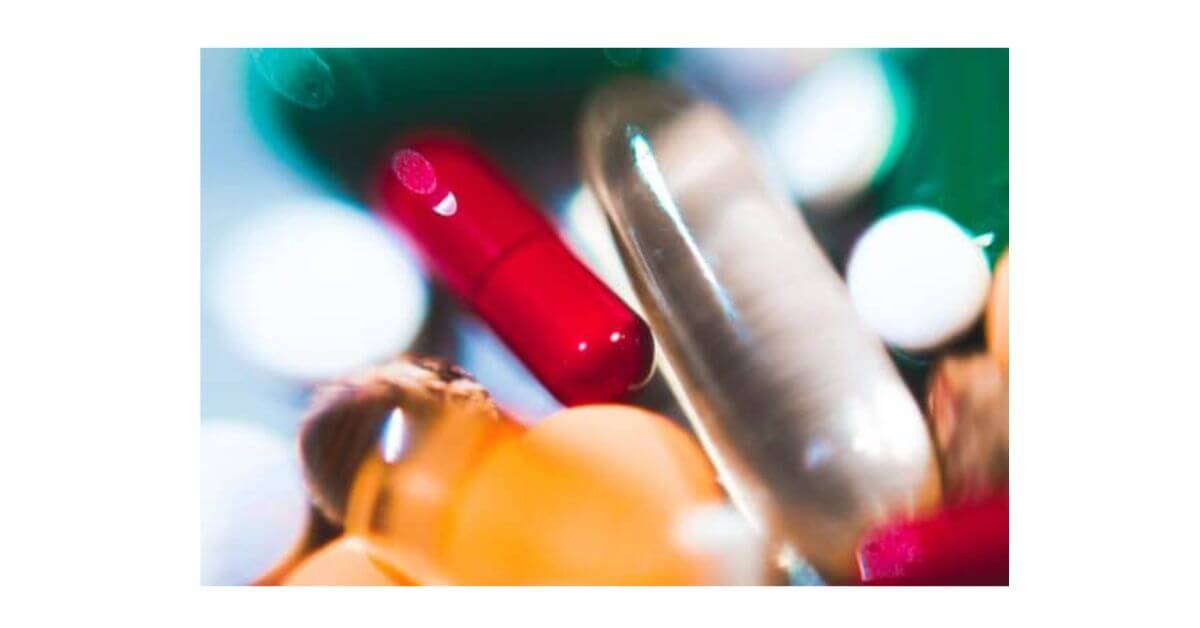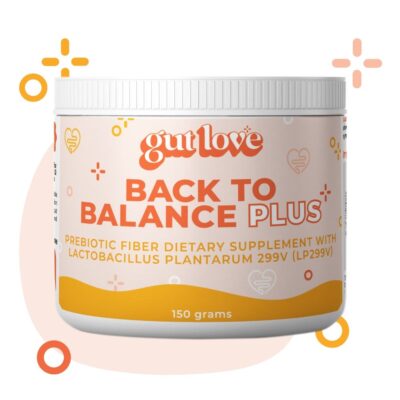Table of Contents
The Best Probiotic Strains
What is a Probiotic?
If you’ve done any online research on probiotics you’ve probably seen a whole lot of conflicting information from claims that a probiotic supplement will cure something to suggestions that probiotics are essentially useless. Like with most things, the truth lies somewhere in the middle and when you really get to know more about this topic- it’s just not so black and white! So let’s clear the air on what we know about probiotics by starting with gaining an understanding of what probiotics are.
Probiotics are live microorganisms that when consumed as a part of food or supplement in adequate amounts confer a benefit to the host (you and I).
Probiotics are measured in colony forming units (CFUs) which tells us the number of live cells in each serving.
How are Prebiotics Different?
You’ve probably also heard people discuss prebiotics too. Prebiotics are food products or supplements that act as a substrate or food source to beneficial bacteria. Essentially, it’s what enables beneficial bacteria to stay and make a home. Prebiotics are often fermentable fibers like artichoke, garlic, onion, asparagus etc. Other foods and drinks like green tea and cocoa also have prebiotic qualities. Also, fermented foods like kimchi, sauerkraut, miso, and natto can also be helpful in diversifying gut bacteria.
What is a Probiotic “Strain”?
When I’m evaluating probiotics for effectiveness the first place I look is at the name- in particular the strain name. I’ll start with a name you are probably familiar with and have seen on products before- Lactobacillus acidophilus. Did you know there are over 57 different types of Lactobacillus acidophilus with proper review and research ? Moreover, Lactobacillus acidophilus is not the full name. It’s what comes after acidophilus- the strain that differentiates it among the other 57.
Where this can get confusing is that companies aren’t required to list the strain name which can be confusing for consumers. And generally, even online probiotics aren’t often discussed with their strain names. But when you look at the research available for individual strains- each one is different. Some strains of bacteria could help, while others can actually make things worse.
Why the Strain Name Matters
There are three parts to naming a probiotic. The first is the genus, the second is the species and the third important part is the strain. Another way to look at this is to compare it to a family. Similar to a family, you have your extended family, intermediate family and the individual. You may be related to your family and share traits, but each individual has unique strengths and weaknesses.
Example: Lactobacillus acidophilus La5
Lactobacillus is the genus (or extended family)
Acidophilus is the species (or intermediate family)
La5 is the strain name (or the individual)
Knowing what strain you are taking is pretty crucial to understanding the impact. There are well-researched strains that have been shown to help with health conditions like – chronic UTI’s, bacterial vaginosis, irritable bowel syndrome (IBS), inflammatory bowel disease – Crohn’s and Colitis, acid reflux and much more. The bottom line here is that if you don’t know what strain you are taking, you will not be able to know the effect that a probiotic will have on your health and gut microbiome.
When the Strain Names are Not Listed
The strain names aren’t listed for many probiotics on the market which makes it hard for consumers to make educated decisions about their purchases. But a few like Culturelle, Jarrow and FloraStor do list strain names. And then hopefully many more brands will do the same in the future. Although some companies will disclose the strains used with a simple call, many in my personal experience do not and claim that they are not able to disclose it for proprietary reasons. And occasionally, when they do know the strain name, it’s often a poorly researched strain. So, my advice is to not purchase probiotics that don’t list strains used.
How to Choose the Right Probiotic
A consultation with your Registered Dietitian or other provider is always a good place to start.
As you can see, a big part of why there is disagreement on if probiotics work or not lies in the quality and disclosure of products used. There is a lot of great evidence for using specific strains, but all of this hinges on the ability of the consumer to choose the best strain for what they are trying to accomplish.
Here are some tips
- Make sure the strain name is on the list (ie. The letters, numbers and sometimes words after the first two identifiers)
- Make sure the probiotic has evidence behind it (I’ll help you with this part below)
- Make sure the probiotic is right for YOU
Best Probiotic Strains
You might be feeling overwhelmed thinking through which probiotic is right for you, so let me share some of my personal favorites. Some listed are available over the counter and that I have no affiliation with. In full disclosure, some of the probiotics listed below are from my own line and business, Gut Love.
Probiotics have helped me in my personal health journey and so many of my patients so my goal with starting my own line of supplements is to provide more people with trustworthy, transparent products and to empower others with the education to choose wisely.
Back to Balance Plus
Back to Balance plus is our most commonly used probiotic and prebiotic because it’s one we have had the highest success rate with for those that suffer with painful abdominal pain, urgency and bloating [2]. With the addition of the prebiotic sunfiber, it can also be helpful in helping stool move at the right pace making it a great fit for those with Crohn’s, UC, and microscopic colitis. It is unique from other prebiotics in that it can help with both constipation and diarrhea.
In mild to moderate Ulcerative Colitis patients the L.plantatrum 299v strain in a drink form has also shown some use with helping to reduce symptoms like bloating, stool frequency, abdominal pain and helping to induce remission [8].
The L.plantarum 299v strain can also help with reducing antibiotic associated diarrhea, and reduce risk of C.diff infection in critically ill patients [7].
In IBD, I like recommending a prebiotic alongside a probiotic because prebiotics have longer lasting impacts than probiotics and can help encourage the growth of helpful gut bacteria.
Can We Help? Get in Touch:
FloraStor, Saccharomyces Boulardii Biocodex
You might see the first two parts of this name in several products, but again it’s not the same as the Biocodex version- Florastor. In fact, I recommend FloraStor to many clients for use with- H.pylori, Giardia, Candida, Small intestinal damage related to Crohn’s or Giardia, SIBO, Antibiotic associated diarrhea and Travelers diarrhea.
Culturelle, Lactobacillus Rhamnosus GG
Culturelle is a readily available over the counter probiotic with a variety of uses. In fact, I’ve found it useful for patients with IBS and upper GI viral infections as well. The LGG strain is also associated with helping lower colon cancer risk [5], reducing antibiotic related diarrhea [6], and helping with postpartum glucose control and weight management [3]. In GI diseases like Crohn’s and Colitis it appears to be helpful for maintaining remission with Ulcerative Colitis but has no positive effect on Crohn’s Disease [10][9].
Lactobacillus plantarum HEAL 9, Lactobacillus paracasei 8700:2
This is a commonly used probiotic in my practice during cold and flu season. In fact, I typically use these strains prior to travel for people who commonly get sick or in those who are at higher risk or higher exposure to sick people (ex. Healthcare workers). This probiotic contains two strains that have beneficial qualities to both help in alleviating symptoms of the common cold. And also shorten the duration of illness after twelve weeks of use. In a randomized double blind and placebo controlled study the two strains led to reduction in the incidence of getting sick, reduction in days sick by 28% and a significant reduction in symptoms [1].
Lactobacillus acidophilus NCFM & Bifidobacterium lactis Bi-07
In a double-blind placebo controlled study published in the Journal of Pediatrics, the two strains were shown to have a positive effect on Influenza-like symptoms and shorten the duration of sickness in children [4]. These strains helped to reduce fever incidence by 73%, reduce coughing incidence by 62%, reduce runny nose incidence by 59%, reduce use of antibiotics by 84% and reduce days absent from school by 28% [4].
Bottom Line
Probiotics can be a great addition to your health care regimen providing you with potential health benefits, but they are not all created equal. Make sure the companies you buy from are transparent enough to disclose the strains used so that you can make the best decision for your health.
If you want to continue reading about the benefits of probiotics and IBD, check out our recent blog post “Which Probiotics Help for IBD?”
Resources:







I have an elderly client who continually suffers from colitis and urinary tract infections. Which should she be taking?
We can’t give guidance on a blog, but you are welcome to reach out about becoming a patient.
I have recently been diagnosed with crohns. I am taking probiotics but would like to add prebiotics to my diet. There are so many I don’t know what one to take. Any advice welcomed thankyou.
Our all time favorite one is here: https://gutlove.us/product/back-to-balance/
Thank you Ashley. Do you have a recommended brand for: Lactobacillus acidophilus NCFM & Bifidobacterium lactis Bi-07.
We purchase your other probiotics but do not see this on your site. Thank you.
Yes, email us and I’ll help you find where to get those!
Thank you Ashley for this post! I’m going to try to find out the strains for this ‘customized’ probiotic I have been taking.
Thanks Sarah 🙂